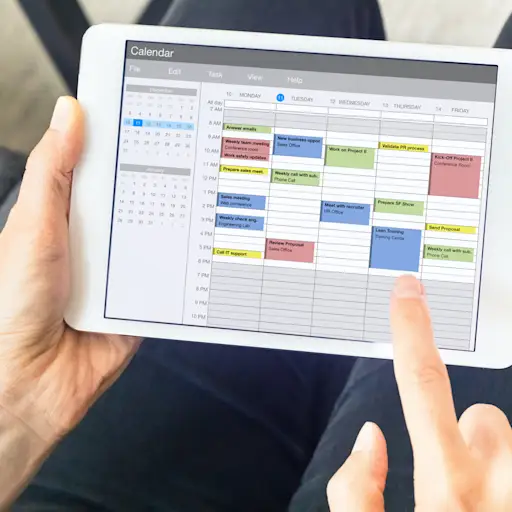如何与老板进行“克罗恩的谈话”

You’ve got Crohn’s疾病,您知道自己的工作程度。但是,您的老板,谁可能会侧向您的频繁浴室奔跑,并在下午离开办公室进行定期约会,而不明白为什么?告诉雇主有关您的慢性状况可能是迈向更易于管理的工作生活的重要一步。“谈话”肯定会令人生畏,但永远不要担心 - 我们有一些技巧可以帮助您像专业人士一样处理它,以便您获得所需的支持和住宿。

你应该告诉老板吗?
Let’s lead with this disclaimer: You don’t have to tell your boss you have Crohn’s—and in some cases, it may not be necessary. It’s up to you and your comfort level. “We advocate that our patents consider talking to their bosses about their disease if they are comfortable with that,” says Robin Dalal, M.D., gastroenterologist and assistant professor of medicine at Vanderbilt University Medical Center in Nashville, TN. Still, in some cases (and especially if you already have a strong relationship), telling your boss about your chronic illness may lead to greater flexibility and support.

Consider How Much Information to Share
That said, you don’t have to tell your boss every detail—or even much at all. “My advice is to be thoughtful with your health information and who knows the details,” says Jason Schairer, M.D., gastroenterologist and co-director of the Henry Ford Inflammatory Bowel Disease Center in Novi, MI. He recommends sharing only what needs to be shared to help you do your job effectively. For example, he suggests that you simply say: “I have a medical condition that can act up with little warning. Can we make sure that I have easy access to a restroom?”

了解您的权利:ADA
了解法律在您身边的方式可以帮助您在与雇主谈论克罗恩的信心时增强您的信心。值得庆幸的是,联邦和州法律有助于支持工作场所慢性疾病的人。一个是《美国残疾人法》(ADA),它保护残疾人免受歧视。要获得残疾人,您需要证明自己的“重大生活活动”(包括工作和/或在肠功能上挣扎)的表现有限。许多IBD符合该标准。如果您有资格,您的雇主必须建立“合理的住宿”才能帮助您执行工作。稍后再详细介绍。

Additional Legal Protections: FMLA
Here’s another one to take advantage of: The Family and Medical Leave Act (FMLA) requires that certain employees be given up to 12 weeks a year of unpaid, job-protected leave for certain medical and family reasons, including if you can’t work due to a serious health condition. This can be a major help if you’re living with Crohn’s: “Consider using the FMLA process to establish time to come to doctor’s visits, procedures, and infusions,” Dr. Dalal suggests. You might qualify for FMLA if you have been employed for at least a year by an employer with 50 or more employees.

Schedule a Meeting
It’s wise to schedule a formal meeting with your boss or HR manager to have these conversations, rather than making it a casual in-passing chat or email. This allows you to show them you did your homework and are clear on the accommodations that you’re requesting. Plus, they’ll see you are serious about collaborating to find a way to do your job effectively—and a good employer will want to join you in those efforts. “An investment in keeping you healthy can pay off with a worker who is more available and productive,” Dr. Schairer says.

Lead the Conversation
Once you walk into that meeting (or sign onto Zoom), have a game plan for how to start the discussion, and be ready to set some boundaries. “Be polite and respectful, but firm,” recommends Dr. Schairer. If you feel like your symptoms have already affected your ability to do your job, you may acknowledge so at the start of the conversation. For example, consider leading with something like this: “You might have noticed that I’ve been using a lot of my sick time lately…” Then explain how you are dealing with a chronic health condition called Crohn’s disease.

知道如何解释你的病情
Educating your employer about Crohn’s can be helpful in some cases, says Dr. Dalal. Again, keep it general—the Job Accommodation Network suggests you just share basic information. Dr. Dalal offers this sample script to adapt to your own comfort level: “IBD is a chronic illness that is cyclical; patients can face associated gastrointestinal symptoms in a recurrent pattern, with periods of symptom inactivity in between active flare-ups and complications. Symptoms may worsen in an unpredictable manner and may go into remission for varying lengths of time. Medications can help manage the discomfort and inflammation but are not cures for IBD.”

准备好您的文档
要获得住宿或休假资格,您可能需要向雇主展示某些文件,以证明您需要它。对于FMLA,您需要一份医生注意,说明您患有严重的健康状况,需要在很长的时间内进行持续治疗,这可能会导致您有时会错过工作。克罗恩斯和结肠炎基金会说,要根据ADA要求住宿,类似的医生的笔记可能就足够了,但是每个雇主都不同,他们可能会要求其他信息。询问您的人力资源部门需要什么文件,或检查您的员工手册。

准备建议的住宿清单
向您的老板或人力资源经理展示,您已经想到了如何在您要求的特定住宿列表中帮助克罗恩的可管理的智能策略。(工作住宿网络提供样本字母模板克罗恩斯和结肠炎基金会说,您可以使用并带来会议。在ADA的领导下,您的雇主必须提供“合理的”住宿,这意味着那些不会在业务上付出“不必要的艰辛”的住宿(例如,超级廉价的请求或需要对工作性质进行重大更改)。

Common Requests to Consider
需要进行医疗预约或手术的时间,或更灵活的工作时间表,包括工作日的工作时间可能是您的榜首,因为这些是使您对工作日的控制和平衡的能力。您的身体和健康需求的工作职责。但是,其他看似较小的住宿也可能产生重大影响,例如,桌子搬迁。达拉尔博士建议:“考虑要索要一个靠近浴室的工作空间。”这可以使整个工作日奔向浴室变得更容易(并且更加谨慎)。

理解的巨大好处
但是,如果您的克罗恩(Crohn)的控制权很好,或者您不需要要求特定的住宿呢?与老板或人力资源经理进行对话可能仍然有好处。例如,知道老板知道您整天在浴室里花一点时间时,您的老板知道您不仅仅是在Instagram上滚动,这可能是您的想法。另外,慢性疾病可能是不可预测的 - 当您感觉良好时,与老板进行谈话,可以使您的健康状况在将来恶化,以增加理解和支持。

底线
While it can be nerve-wracking (and maybe even scary) to think about telling your employer that you have Crohn’s disease, staying silent can have its own costs, too. Let’s emphasize: It’s your private health information, and you get to choose how (and how much) you share about it. These tips can help you feel more confident and prepared going into a disclosure meeting with your employer—and lead to more support for you, including specific accommodations, increased understanding, and reduced stress. You’ve got this!
Americans With Disabilities Act:ada.gov。(2021.)“ ADA简介。”https://www.ada.gov/ada_intro.htm
家庭和病假(FMLA):美国劳工部。(2021)。“家庭和病假(FMLA)。https://www.dol.gov/general/topic/benefits-leave/fmla
Working With IBD:Crohn’s and Colitis Foundation. (2015.) “Employment and Inflammatory Bowel Disease.”https://www.crohnscolitisfoundation.org/sites/default/files/legacy/assets/pdfs/employment-and-inflammatory.pdf
在工作中披露残疾:工作住宿网络。(2021.)“残疾披露”。https://askjan.org/topics/disability-discluse.cfm
Lara is a health writer, trauma-informed art therapist, and registered associate marriage and family therapist practicing in Los Angeles. She is also a former digital editor for HealthCentral, covering Sexual Health, Digestive Health, Head and Neck Cancer, and Gynecologic Cancers. In a past life, she worked as the patient education editor at the American College of OB-GYNs and as a news writer/editor at WTOP.com.

